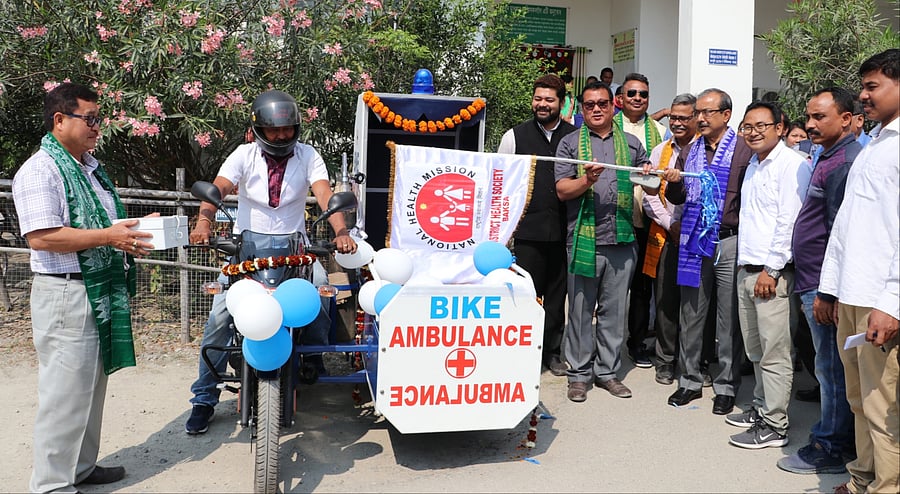
Bikes are not just a convenient mode of transport but can be lifesaver. Health officials in Baksa, one of the remotest districts in Assam sharing border with Bhutan believes the two wheeler can save lives and help them improve maternal mortality and infant mortality rate too.
With this hope, the officials inducted bike ambulance service on Monday for patients living in "hard to reach" areas, particularly the pregnant women and children.
Three bike ambulances equipped with a portable oxygen cylinder, first-aid kit, air-splints, GPS and communication devices were flagged off by Ansumwi Khungur Boro, executive member (agriculture) of Bodoland Territorial Council that governs Baksa and four other districts--Chirang, Kokrajhar and Udalguri in Western-central Assam.
Baksa district media expert, National Health Mission (NHM), Prashanta Kumar Dutta said the bike ambulance service was introduced on a pilot basis as part of the North East Council, DONER ministry and Niti Ayog's "aspirational districts" project. The three bike ambulances were flagged off from Dr. Ravi Boro Civil Hospital at Musalpur. "Seven more are expected to reach the district soon," said Dutta.
Joint director of health services, Baksa, G N Dev Sharma hoped the bike ambulance would prove to be lifesaver as many areas are neither easily accessible nor affordable due to poor road communication and lack of bridges in some areas. "Some areas even remain cut-off due to natural calamities like floods almost every year. There are some hard to reach areas (seasonal) where ambulance service is unable to reach due to narrow road and also due to shortage of ambulance. Bike ambulance can reduce the gap between health facility and the patients. Baksa district is having 21 hard to reach areas but out of which most 10 are very critical areas, which are not easily accessible," he said.
The officials hope that the bike ambulance would help them increase institutional delivery and thereby reduce maternal mortality (237) and infant mortality (44). The national rate of MMR and IMR is 130 and 33 respectively.
"The activities of the bike ambulance will be monitored weekly at block level and monthly at the district level. Benchmark for each bike for carrying the patients will be 20 per month. To encourage the team members, the performance based incentive will be made eligible for the facility," said Karuna Brahma, Baksa district programme manager, NHM.
